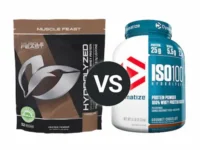Knowledge BaseYou're Questions Answered
BACK
Is whey protein bad for cholesterol?
Concerns about whey protein and its impact on cholesterol are common, especially given the prevalence of heart disease. However, studies have shown that whey protein may actually have beneficial effects on cholesterol levels, contrary to concerns that protein supplements could negatively affect cardiovascular health.
Impact of Whey Protein on Cholesterol
- Lowering LDL Cholesterol: Whey protein has been found to help lower LDL (low-density lipoprotein) cholesterol, often referred to as "bad" cholesterol, which is a risk factor for heart disease1.
- Increasing HDL Cholesterol: Some studies suggest that regular consumption of whey protein can lead to a slight increase in HDL (high-density lipoprotein) cholesterol, known as "good" cholesterol, which helps remove other forms of cholesterol from your bloodstream2.
Potential Mechanisms
- Bioactive Compounds: Whey protein contains bioactive components that may influence cholesterol metabolism. These compounds can enhance the elimination of cholesterol and reduce the absorption of cholesterol in the intestines1,3.
- Improving Body Composition: Whey protein supplements can aid in weight management and muscle building. Improved body composition through increased muscle mass can lead to better metabolic health, indirectly supporting healthier cholesterol levels2,4.
It’s important to consider that the impact of whey protein on cholesterol can vary depending on overall diet, lifestyle, and genetic factors. Including whey protein as part of a balanced diet that includes plenty of fruits, vegetables, whole grains, and healthy fats is likely to be more effective in managing cholesterol than relying on any single food or supplement alone.
Was this answer helpful? Let us know!
Like
References:
- Pal, S., & Ellis, V. (2010). The chronic effects of whey proteins on blood pressure, vascular function, and inflammatory markers in overweight individuals. Obesity, 18(7), 1354-1359.
- Frestedt, J. L., Zenk, J. L., Kuskowski, M. A., Ward, L. S., & Bastian, E. D. (2008). A whey-protein supplement increases fat loss and spares lean muscle in obese subjects: a randomized human clinical study. Nutrition & Metabolism, 5(8).
- Krissansen, G. W. (2007). Emerging health properties of whey proteins and their clinical implications. Journal of the American College of Nutrition, 26(6), 713S-723S.
- Smithers, G. W. (2008). Whey and whey proteins—From ‘gutter-to-gold’. International Dairy Journal, 18(7), 695-704.
Add to this Answer
Related Questions

Disclosure
Your Answer
Do you have a suggestion to improve the answer? Please detail your suggestions and provide any references to information that may support your answer if available.
The content on this site has not been written, reviewed or endorsed by a medical professional. We assume no liability for the misuse of supplements and recommend you review the label of any product, as well as consulting with your health care professional.
We are a participant in the Amazon Services LLC Associates Program, an affiliate advertising program designed to provide a means for us to earn fees by linking to Amazon.com and affiliated sites.
We are a participant in the Amazon Services LLC Associates Program, an affiliate advertising program designed to provide a means for us to earn fees by linking to Amazon.com and affiliated sites.
© 2026 ProteinPowder.com






